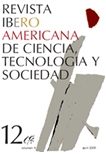A construção do Espaço Ibero-americano do Conhecimento, os estudos sobre ciência, tecnologia e sociedade e a política científica e tecnológica
DOI:
https://doi.org/10.52712/issn.1850-0013-895Palavras-chave:
estudos sobre ciência, tecnologia e sociedade, política científica e tecnológica,, Ibero-américa, Brasil, ArgentinaResumo
A motivação deste trabalho é a idéia de que a construção de um espaço ibero-americano do conhecimento demanda a redução do hiato existente entre a orientação da Política Científica e Tecnológica (PCT) e a perspectiva dos ECTS. Três países – Argentina, Brasil e Espanha – são analisados visando a (1) explicar porque, sendo uma das finalidades dos ECTS a introdução de sua perspectiva na agenda da PCT, através do debate público e da formação de profissionais, isto não tem ocorrido; (2) argumentar que esse hiato vem se ampliando porque os fazedores da PCT estão influenciados pelo marco analítico-conceitual da Teoria da Inovação, acriticamente adotado na ibero-américa; (3) mostrar que a busca de convergência entre os ECTS e a PCT depende de um debate sobre ESCT no interior da comunidade de pesquisa e da concepção de estratégias de extensão, pesquisa, e docência em ECTS que levem à formação de uma nova geração de fazedores de política.
Downloads
Referências
CARDOSO, F. H. e FALETTO, E. (1970): Dependência e Desenvolvimento na América Latina, Rio de Janeiro, Zahar.
CUTCLIFFE, S. (2003): Ideas, Máquinas y Valores - los Estudios de Ciencia, Tecnología y Sociedad, México D.F., Anthropos Editorial.
DAGNINO, R. (2007): Ciência e Tecnologia no Brasil: o processo decisório e a comunidade de pesquisa, Campinas, Editora da UNICAMP.
DAGNINO, R.; THOMAS, H. e DAVYT, A. (1996): “El pensamiento en Ciencia, tecnología y sociedad en América Latina: una interpretación política de su trayectoria”, REDES, vol. 3, nº 7.
HERRERA, A. (1971): Ciencia y política en América Latina, México D.F., Siglo XXI.
KATZ, J. (1987): Technology Generation in Latin American Manufacturing Industries, Londres, Macmillan Press Ltd.
LÓPEZ, J. (2004): “Ciência, Tecnologia e Sociedade: o Estado da Arte na Europa e nos Estados Unidos”, en Santos, L. et al. (orgs.): Ciência, Tecnologia e Sociedade: o Desafio da Interação, Londrina, IAPAR.
LÓPEZ, J. (2005): “Ibero-american Perspectives”, en Mitcham, C. (ed.): Encyclopedia of Science, Technology and Ethics, Michigan, Thomson Gale.
MARTÍNEZ VIDAL, C. e MARÍ, M. (2002): “La Escuela Latinoamericana de Pensamiento en Ciencia, Tecnología y Desarrollo. Notas de un Proyecto de Investigación”, Revista de la OEI, nº 4.
O’DONNELL, G. (1978): “Apuntes para una teoría del Estado”, Revista Mexicana de Sociología.
PALACIOS, E.; GONZÁLEZ, J.; LÓPEZ, J.; LUJÁN, J.; MARTÍN, M.; OSORIO, C.; PEREIRA, L. e VALDÉS, L. (2001): Ciencia, tecnología y sociedad - una introducción al estudio social de la ciencia y la tecnología, OEI, Madrid.
SABATO, J. (1975): El pensamiento latinoamericano en Ia problemática ciencia-tecnología-desarrollo-dependencia, Buenos Aires, Paidós.
VACCAREZZA, L. (2004): “Ciência, Tecnologia e Sociedade: o Estado da Arte na América Latina”, en Santos, L. et al. (orgs.): Ciência, Tecnologia e Sociedade: o Desafio da Interação, Londrina, IAPAR.
VERSINO, M. (2006): Los discursos sobre la(s) política(s) científica y tecnológica en la Argentina democrática: o acerca del difícil arte de innovar en el “campo” de las políticas para la innovación, Campinas, DPCT.
Downloads
Publicado
Como Citar
Edição
Seção
Licença
Copyright (c) 2025 CC Attribution 4.0

Este trabalho está licenciado sob uma licença Creative Commons Attribution 4.0 International License.
Todas os números de CTS e seus artigos individuais estão sob uma licença CC-BY.
Desde 2007, a CTS proporciona acesso livre, aberto e gratuito a todos seus conteúdos, incluídos o arquivo completo da edição quadrimestral e os diversos produtos apresentados na plataforma eletrônica. Esta decisão é baseada no entendimento de que fornecer acesso livre aos materiais publicados ajuda a ter uma maior e melhor troca de conhecimentos.
Por sua vez, em se tratando da edição quadrimestral, a revista permite aos repositórios institucionais e temáticos, bem como aos sites pessoais, o autoarquivo dos artigos na versão post-print ou versão editorial, logo após da publicação da versão definitiva de cada número e sob a condição de incorporar ao autoarquivo um link direcionado à fonte original.











